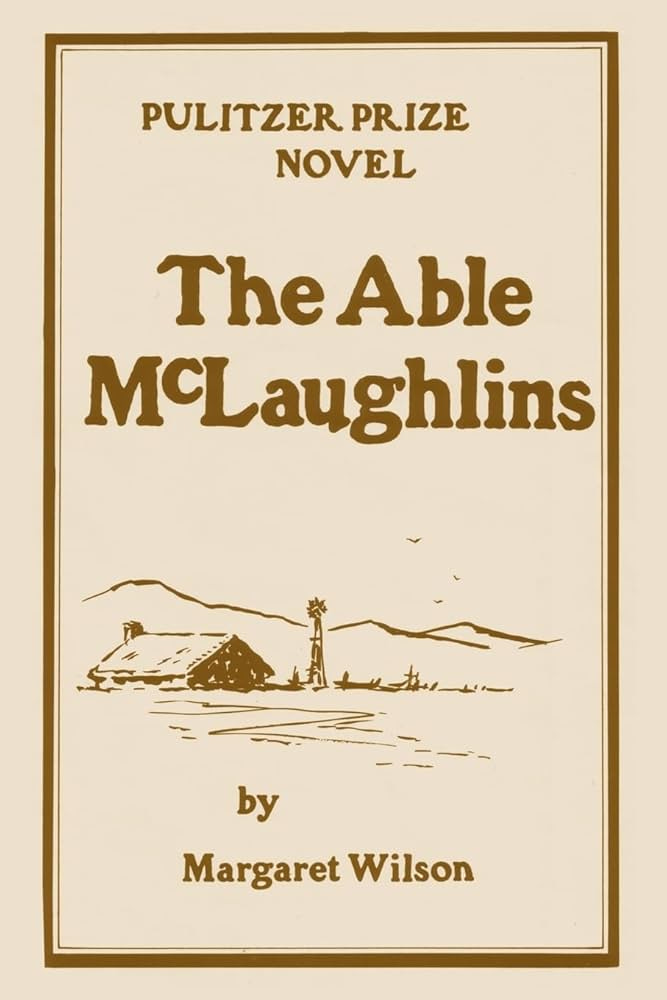What to Read Next: July Pulitzer Wrap + More 1920s Fiction Winners
Issue #340, featuring Sinclair Lewis and Margaret Wilson
Happy Friday, readers!
I’m doing something a little different today that will become a new regular feature here at Read More Books. Given your enthusiastic response to following along with my Pulitzer Project, at the end of each month I’ll give about half the newsletter to a ~30-day wrap up, and the other half to quick-hit reviews of the Pulitzers I didn’t love. (Maybe it’ll end up being every other month? I’ll experiment a bit.)
Most months, I read one or two books that don’t make the cut for featuring here in the newsletter. But for something like the Pulitzer Project, it can be fun to follow along with every title, even if I don’t broadly recommend it and even if you don’t have any intention of reading it.
On that note, it’s worth a reminder that I’ve spiffed up my project spreadsheet, so that titles I’ve read are bolded, along with the month/year I read them. I also started including links for those books that I’ve reviewed in the newsletter. Finally, I added a “Progress” tab which shows my Pulitzer reading in chronological order, as well as the book(s) I’m currently reading.
Let’s get to it.
July Putlizer Recap
In July, I finished five Pultizer-winning titles:
Evicted by Matthew Desmond (2017, General Non-Fic) | Read my review
So Big by Edna Ferber (1925, Fiction) | Read my review
Demon Copperhead by Barbara Kingsolver (2023, Fiction) | Review coming next week
Arrowsmith by Sinclair Lewis (1926, Fiction) | Review below
Guns of August by Barbara Tuchman (1963, General Non-Fic) | Review coming in two weeks
Overall progress: 48 out of 382 total titles (that number counts series as a single title).
My favorite of this group was definitely Demon Copperhead. I’ll be reviewing that one in full next week. My least favorite was probably Arrowsmith, even though I mostly enjoyed it (keep reading).
Below is what’s (probably) on tap for August. The novels are on the short end, so I may be able to sneak in one or two more depending on the craziness that comes with the start of the school year:
Early Autumn by Louis Bromfield (1927, Fiction)
The Bridge of San Luis Rey by Thornton Wilder (1928, Fiction)
Scarlet Sister Mary by Julia Peterkin (1929, Fiction)
A History of the Civil War by James Ford Rhodes (1918, History)
The Able McLaughlins by Margaret Wilson
Margaret Wislon was not a name I had heard before diving into this Pulitzer Project. Like many of these early winners, The Able McLaughlins is set in the Midwest — in this case it’s the prairies of Iowa. Wully McLaughlin is a Civil War vet with eyes for Christie McNair. When he gets home from the war, however, Wully finds that his sweetheart has been assaulted and is pregnant as a result. From there, the novel focuses on how Wully responds and builds his life with Christie.
The premise is compelling and the themes of love, revenge, and belonging were nuanced and mostly well done. The problem was that Wilson’s style just didn’t do it for me. The dialogue was very Scottish and the prose itself felt too safe and stilted. I’m glad to have read it, but can’t really recommend it.
Arrowsmith by Sinclair Lewis
Sinclair Lewis always had a prickly relationship with the Pulitzer Prize. He felt he should have won 1921’s prize for Main Street, but the committee didn’t deem that novel wholesome enough. It’s hard to believe they thought 1925’s Arrowsmith fit that particular bill, but the Pulitzer committee is a strange and unpredictable beast — even to this day. Lewis actually rejected the prize, but his name is in the Pulitzer records nonetheless.
Arrowsmith follows a few decades in the life of Doctor Martin Arrowsmith. After getting through medical school, his career jumps around quite a bit, from a small town practice to a vaccine lab to the public health sector and more. The main theme that Lewis delves into is the commercialization of science, as well as how scientists balance ambition with the greater good.
Overall, I enjoyed Arrowsmith well enough and found it to be a creative, well-written story that explored a lot of the culture around health care and the industry of science. That said, I have a hard time broadly recommending it — Lewis’s style eventually got a bit dry and, by the end, the story felt about 100 pages too long. (My edition was 460 pages.) It’s not for everyone, but if you’re interested in the philosophy of healthcare and scientific research, you may find it rather compelling.
Thanks so much for reading. I deeply appreciate your time and inbox space.
-Jeremy




Happy Friday! Neat spreadsheet 😁
Can’t wait to read your review of Demon Copperhead and of The Bridge of San Luis Rey. Both are on my TBR! I just recently reread Thornton Wilder’s Our Town before I read Ann Patchett’s Tom Lake (written as a tribute to Wilder’s works, specifically Our Town).
I saw you read this back in 2020, but what did you think of Powers’ The Overstory? Super curious because his upcoming novel set to publish this September was already longlisted for this year’s Pulitzer - Playground.
Thank you so much for this review! The Able McLaughlins has been on my list for years and I am now going to remove it. You read it so that I wouldn't have to.
Have a great weekend!